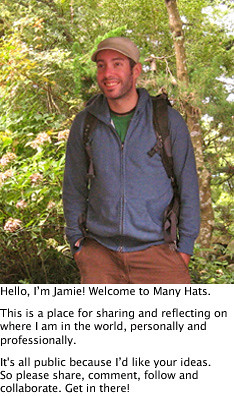A Greener Shade of School
I read an article today that got me thinking about the notion of Green or Environmental schools. The Hindu, an English-language Indian newspaper, featured the school Sholai Cloaat. A small “enviro-ed” school in the mountains of Tamil Nadu.
The Sholai School is the brainchild of Brian Jenkins. A Brit by birth, but long term resident of India. He founded the school out of inspiration gathered through study with his guru, Krishnamurthy and travelled 7000 km to find the right location. The campus borders on a national park, with frequent elephant sightings, is completely off the grid, and powered through a combination of solar energy and biogas. The students are a mixture of international expat kids and others from around India, but half are local scholarship students who pay no tuition. The curriculum meets the standards of the University of Cambridge syllabus, but is filled out with farming, waste management, carpentry and construction, trekking, bird watching, yoga and much much more. They’ve apparently been busy building an engine for Jenkins’ car, that can run on both petrol and biogas.
What strikes me about this is both its differences from other schools, and its similarities. I had a chance to visit the Green School in Bali a couple summers ago and many of the traits that we see at the Sholai School are evident here as well.
Both were started by foreign nationals with an environmental passion and a drive to reinvent education for expats as well as locals. Both subsidize and further their work by running programs for individuals from outside their regular student body. Both go to great lengths to form strong connections with the local communities and provide scholarship opportunities for local kids. Both clearly promote an integrated curriculum, based on an adopted set of standards (either Cambridge or IBO). Both have gone to great lengths to construct their campuses in a sustainable manner, based on local materials.

For one project, students learned different lashing and knot-tying techniques, and were tasked with building temporary shelters. From: Craig Cerhit, Maple Ridge News
A third school, The Environmental School Project (of Maple Ridge, BC, Canada), takes one extra step. As a member of a public school board, they are very clear about what makes them different. They go as far as to call their education system “place-based imaginative and ecological education”, reminding me of the Reggio Emilia Approach belief in the Environment as a teacher. This school drives home the notion for prospective families that the students will be spending time outdoors a lot. Whatever the weather. Kids will be safe and warm they say, but they may not have access to flushing toilets, and they will certainly be faced with new challenges on the way to seeing their skills flourish in the outdoors. Similarly to the other two institutes, this one also guarantees that they will deliver the provincial curriculum, but maintain that that is only a fraction of the learning that will be going on.
Read more:
Sholai School, Tamil Nadu: website, article from The Hindu
Green School, Bali: website, press page, CNN article
The Environmental School Project, British Columbia: website, article from Maple Ridge News
Other Schools worth a look:
Imagine: Environmental Charter School, Sunnyside Environmental School, Learning Gate: Community School
Midnight at the Sausage Factory
This afternoon a friend called me up and asked if I could meet him for a coffee and take a look at a paper he was writing for his Masters program. This friend is one of the clearest thinking people I know, and he was feeling really spun around by the expectations of his program.
He started off by showing me the rubric provided for the piece of work and I immediately understood why he was feeling lost. It was completely vague, had several typos and no real overall suggestion of what the paper was meant to be about. He had still struggled through and written several thousand words, but felt really unclear.
This rubric, he said, was all they’d been given as guidance for the project. His program is online, and he has never met his professors, but in his interactions on the forum (where they’re expected to be posting comments weekly), he’s found the professors really aggressive and confrontational. He said that at one point someone asked for clarification on a task and was quite brutally shot down. He personally felt like each and every one of his comments was shredded and diminished, and his previous paper, which he’d been just as unclear about, had just gotten a passing grade.
Awful, right?
So this is what I wonder… I’m doing my Master’s now as well. Through COETAIL and assorted other qualifying courses. One of the key differences between COETAIL and other non-traditional programs is that I do still have a cohort who I meet with, in person, several times per course. I think this has been immensely valuable as a community-building element of the program, but additionally I think it has allowed for a much more varied range of learning experiences. No doubt this blog has still been the backbone of my work, but it still exists in a specific learning community.
I think the balance of in-person and online interactions serves other purposes as well. For one, I wonder whether my friend would have had such a sense of being lost in a program if he’d met his peers. And I wonder if his profs would have addressed everyone so aggressively if they were also expected to be meeting them in person.
What knocked me down as well was the consideration that he was being expected to write essays. Formal, traditional essays. With specific word counts. Seriously, I’m sure many would argue this, but I just don’t quite see how presenting information in that format makes too much sense at this point. Especially when this essay he was writing was meant to be a reflective personal educational philosophy (from what we could deduce). I try to imagine what it would have been like for me if all of my work for this program had been formal essays and I shudder. I would have spent so much time working on the refined tenor required, that I don’t doubt I would have lost the value and reflective elements that this blog has served so well. A blog post can connect to anything else out there, use varied media and more. More than that, I understand the motive for presenting ideas with balance. But it’s in part the very subjective, personal nature of a blog that makes the ideas resonate for me. The goal is not to make your writing align with everyone else’s. Maybe it’s more of a buffet than a sausage factory. An essay…? Very static. The kind of document written to be read by a really thin slice of the pie. I wonder how long it will last as a dominant format of academic writing.
Anyways, the interaction made me very pleased to be completing this program in the way that I am.
Essays… Word counts… Oh my.
I had a conversation with Madeleine Cox a little while ago that kept wiggling around the back of my brain. At least I’m pretty sure I did. If she wasn’t there at the time, somehow she managed to squeeze wigglingly in there with it.
The conversation was about the idea of a place for economic literacy in high school curriculum. I believe (again, this could just be the wiggling), that she was asking me whether I thought there was one.

Oh potash, I never even knew what you looked like until now... Image by Ian Geoffrey Stimpson from Flickr
At the time, my answer was a direct and unjustified yes. Why not? It’s certainly something that we all have to interact with in our lives. Something with significant bearing on the parameters of our lives. I spent time learning that potash was a major export of Saskatchewan in high school… Maybe learning a little about the complex and sordid life of my money is at least as valid and relevant as that, isn’t it?
Anyways, the wiggling notion was given a boost today when I listened to a Freakonomics podcast entitled:
What Do Hand-Washing and Financial Illiteracy Have in Common?
By structuring a debate about causes and solutions for American financial illiteracy it kind of refreshed my internal dialogue around this discussion. The main combatants and their weapons of debate were (extracted from Freakonomics.com):
Annamaria Lusardi, an economist at George Washington University, who has spent the past 10 years studying the topic, and believes that education is the way out:
LUSARDI: In the same way we start people, you know, in school just reading and writing, you know, from the very beginning. We don’t teach literature so that people go on and write “War and Peace,” but we teach it so that people can appreciate a good book.
Next is Lauren Willis, a legal scholar who previously worked at the Justice Department and the Federal Trade Commission. She has argued against widespread financial education, recommending instead a new cadre of financial advisers and greater transparency and regulation in the financial industry:
WILLIS: It’s sort of like saying, well we should start teaching everybody to be their own doctor, teaching everyone to be their own mechanic, you know, something like that, terribly inefficient to do that. Not only is it inefficient, but it has this sort of culture of blaming the consumer. You know, you’re the one who didn’t figure this all out.
After listening to both of them though, I’m stuck wondering why we don’t do both. I’m not sure why making an effort to embed some financial literacy in high school would negate the need for better financial advisers and greater transparency and regulation of the financial industry. It might even give people a more educated means of demanding just that. Certainly, the likely correct assumption that it wouldn’t be done particularly well at first seems like an awfully defeatist reason not to get the ball rolling.
Willis suggests that the level of expertise required to successfully navigate the modern financial world is equivalent to the expertise of a Formula 1 driver, and rightfully perhaps points out how unfair this expectation is. But if we’re all inevitably going to be put in that speeding car anyways, we may as well take a driving lesson when we turn sixteen.
At the very least, could someone stop making all Canadian teenagers memorize facts about the mineral wealth of Saskatchewan?

All the peripherals for my Dick Smith VZ200. Just plug it into a crap TV, slap in a tape and wait for very little to happen... Image from gateman.com/museum/e.html
When I was around ten my grandfather bought me a computer. With a little research I’ve discovered it was a VZ200 (thanks old-computers.com). I plugged it into an old school 12 inch black and white TV. It had no hard drive or anything like that. As far as I recall, to run programs you could either load them off audio cassette tapes, or program them in yourself. The whole process of loading off a tape and hooking it all up was so cumbersome, that after a few goes at the simple games, I was over it.

Games on Tape: They seem more exciting in retrospect than they were at the time...
Clearly out of concern for my street cred, around that time my parents sent me off to computer camp for a week or two. I don’t recall much, but I do remember sitting in a dark computer lab, learning to program some very basic things in the aptly named programming language, Basic.
By the end of the week I’d learned how to make my computer count forever –clearly a productive task– and spent far too long watching ever-growing numbers scroll up the screen.

A Commodore PET. Hours of "Where in the World is Carmen Sandiego?" waiting to happen. Image from Pikturewerk on Flickr.
This was my one computer trick for the next five years or so. In middle school I remember the lab had a few Commodore 64s and PETs. They’d all counted up to some pretty damn high numbers by the time I was done with them. On top of that, the mini-geography nerd in me had a brief fling with Carmen Sandiego… But then high school, nothing. Really. I don’t recall actually touching a computer during high school. I had an electric typewriter with a small 100-character display and that was that.
So it’s likely of little surprise that when I moved to Montreal to begin film school, and my parents gave me an Apple LC, I was almost aggressively disinterested. None the less, they were clearly somewhat less grumpy inward-looking teenagers than I was at the time, and they insisted it would be useful. They even plugged it all in on my new desk. When they turned it on, I distinctly remember thinking, “hmm… The pictures are in colour now… That does look a bit better…”
All the same, a few games of Oregon Trail, and some late night essay-writing was about all the love it got, for the following two years. This didn’t change until one of my friends came around with a laptop he’d recently bought. He plugged in the modem and I first heard that squealing dial-up handshaking sound as he connected to the internet.

Enter the Internet... And a whole new world of reasons to use a computer. Image from Derek K. Miller on Flickr.
And with that, everything changed. Within a few months I’d bought a PowerPC with a whole gig of hard drive space and a screeching dial-up modem. I was off.
I wonder, when we look back, if that will seem like a transition on the scale of the industrial revolution, the introduction of cars, or telephones. And this scale of reaction from someone who saw it all in urban, western increments. Imagine the contrasts for someone whose grown up in a setting where contemporary technologies haven’t replaced just incrementally different modes, but entire generations of tech growth have been skipped. Where video conferencing, social networking and e-commerce on smart phones has arrived in one of the many places where there were no phones at all, and little travel or exchange outside of the immediate community.
With that rate of change, it’s no wonder rising stars of digital culture like Pinterest or Instagram seem like bandwagons we should all be on, but when I start to look at my own digital footprint, portfolio, presence or whatever you want to call it, there are some notably questionable investments of time, thought and energy.
In my next post, I want to look at where that’s getting me. What pressures are pushing me along, and what counter-pressures pull me back and make me reflect. In the meantime, I’m either going to go for a walk or update my Facebook.
Literacy vs Knowledge
I love this.
I love it when you read something that manages to express a belief you know you’ve held for some time, without ever having found the words or means to put it out into the world. It’s just happened to me.
I was revisiting the website Route 21, a research project and proposal from an organization called the Partnership for Twenty-first Century Skills. And I followed a link describing an approach to core academic subjects in the 21st century.
What it proposed was a set of literacies that point a refreshing lens on some tired sideroads of curriculum. They propose the need for core subjects (such as Language, Math, Arts etc.) to be taught in the context of what they term themes, but I prefer to keep using their word literacies instead. They are, in no particular order:



The reason I like the term literacy applied to these is that when we look at them as subjects or themes, it seems to suggest an established and somewhat static body of knowledge, history and theory that one can learn and apply to exams and hopefully life. Whereas literacies to me imply the idea of a background underpinning of knowledge that works in collaboration with interdisciplinary skills to support critical and reflective approaches to an ever-evolving stream of information, challenge and experience. Literacy does not seem a stagnant thing the way subject study can default to being…
In terms of the choice of literacies in this project, I think they’re pretty spot on. Certainly each of them is a complex and evolving aspect of our personal and cultural lives. Each has local and global application. Each is a deep, resonant and meaningful area, with enormous potential for integrating the purposeful learning of traditional core skills.
I think in part it’s that learning the tools of a kind of literacy that has appealed to me in the study of digital literacy and my current Masters as well. This is not about learning best practices and a set of tools. It’s about acquiring the literacy needed for critical and reflective approaches to whatever comes next.
All photos by Jamie Raskin
MY CLASS BLOG
This is my classy, yet personal blog. For my less personal –but perhaps classier– classroom blogs, click here, or here.MANY HATS in your inbox
Subscribe to Many Hats...

many hats by Jamie Raskin is licensed under a Creative Commons Attribution-NonCommercial-ShareAlike 3.0 Unported License.Details… details…
CATEGORIES
@jamieraskin
My TweetsINVASION PROGRESS
HISTORY
MANY COMMENTS
















